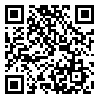BibTeX | RIS | EndNote | Medlars | ProCite | Reference Manager | RefWorks
Send citation to:
URL: http://ijpcp.iums.ac.ir/article-1-202-en.html
Abstract
Objectives: This study was conducted with the objectives of assessing general practitioners’ knowledge of conversion disorder.
Method: Using the available convenient sampling, 136 general practitioners were selec-ted as the subjects of the study. The instruments used for this study included a 20-item ques- tionnaire, hypothetical case histories, and a diagnostic and treatment questionnaire.136 res- ponses obtained from the subjects prior to two retraining programs in psychiatry were ana- lyzed by using Mann-Whitney and Kruskal-Wallis non parametric statistics.
Findings: Despite achieving high grades on the medical diagnosis questionnaire, the sub-jects scored poorly on the questionnaire related to conversion diagnosis. The subjects attained inadequate scores of 24, 16, and 22 respectively on the diagnosis of pseudoseizure, conversion paralysis, and conversion blindness. There was no significant correlation between the average scores on the diagnosis with the subjects’ gender and university of graduation. However, a negative significant correlation was noted between age and the length of time since gradua- tion with the scores acquired on conversion diagnosis.
Results: Based on the findings of this study, the knowledge of the general practitioners on medical diagnosis was acceptable, but in the area of conversion diagnosis, their knowledge was poor.
Received: 2007/10/24 | Published: 2003/07/15
| Rights and permissions | |
 |
This work is licensed under a Creative Commons Attribution-NonCommercial 4.0 International License. |



